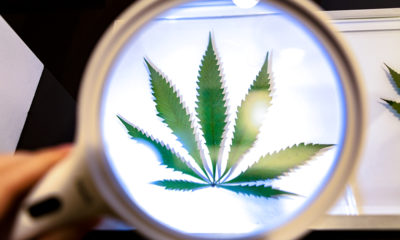
Medical
Does Cannabis Cause Psychosis: Coincidence or Causation
Links between cannabis use and mental-health problems like psychosis appear in scientific literature and media, but there’s more smoke here than fire.
She had already had a history of major depression, but then the 20-year-old woman started cutting and electrocuting herself. At the psychiatric ward, looking for an explanation or a cause, doctors noticed that before she’d checked into a hospital, she’d already been in the ICU—for “vaping-related lung injury” after “recurrent, severe, and heavy THC use.”
And that, according to the presentation made by Michigan-based psychiatrist Chad Percifield, to the American Psychiatric Association’s annual meeting, was enough to finger her cannabis consumption as a potential cause—and enough to warn other heavy cannabis users that they could be next to have a mental break.
“Research has previously shown that individuals who consume THC are three times as likely as those who do not to develop a psychotic disorder,” Percifield told the Midland Daily News. This was one in a series of media reports and scientific studies suggesting a link between cannabis use and psychosis, published in the Journal of the American Medical Association as well as The Wall Street Journal’s op-ed page—under the sub-headline “Port and psychosis link is real, researchers say.”
But is it? And how real—if you’re of sound mental health, will a couple of pulls from your vape pen push you over the line? And how should cannabis users and advocates react to news of cannabis coexisting with psychotic breaks, often dishonestly framed as a causal link and cause to re-evaluate or delay marijuana legalization plans?
Smoke, Then Break?
Psychosis is defined as a break from “reality” that usually manifests as hallucinations or delusions—hearing or seeing something that other people can’t see or hear, such as voices or sounds. Cannabis-induced psychosis is a disconnect from reality that occurs during cannabis use, or shortly thereafter.
According to researchers, this phenomenon is real. Jeffrey Chen, a physician and founder of the University of California, Los Angeles’s Cannabis Research Initiative wrote, “Cannabis-induced psychosis has emerged as one rare but serious side effect to consider.” However, he adds, while literature suggests a “strong link” between using cannabis and developing psychotic symptoms, “experts have yet to discover the exact nature of that link.”
Meaning, researchers aren’t sure if cannabis causes psychosis, or triggers or exacerbates underlying symptoms.
(Keep in mind that substance abuse generally coexists with mental-health problems. Victims of trauma tend to use alcohol and other drugs more heavily than the general population, but that doesn’t mean that the alcohol caused the behavioral health problems.)
And that’s the problem with most of the studies.
A prominent study that earned media in mid-July, suggested a link between cannabis and psychosis, and according to Michael Backes, a researcher and author of Cannabis Pharmacy: A Practical Guide to Medical Marijuana: it assumes that cannabis was causal when it could simply co-relate.
The Missing Link
In July, the Journal of the American Medical Association (JAMA) published a study out of Denmark that found the number of schizophrenia diagnoses “associated with cannabis use disorder” had increased from 2 percent in 1995 to 8 percent since 2010, as CNN wrote when reporting on the study. However, the study simply noticed the increase of sufferers of schizophrenia that also reported problematic cannabis use (something that people may have been less comfortable sharing with their doctors in the 1990s).
“In studies like this one, people seeking treatment for cannabis issues appear to have higher incidence of schizophrenia,” Backes told Cannabis Now. “But are the symptoms of schizophrenia driving some of these individuals toward cannabis in an attempt to self-treat their symptoms?”
“There is not enough evidence to support an assertion that cannabis is a cause,” he added.
In other words, cannabis users who developed psychosis or dependence problems may also have worn belts, or used money, or had poor diets, yet these aren’t fingered as the causal factors. And that same report on the study noted that “most cannabis users, even those who are dependent on it, never seek treatment and many people use it recreationally without developing problems.”
So, what, then, is the best way to understand cannabis and mental-health problems—and how should researchers, policymakers, and the public best understand the issue?
Debate of Substance
In Colorado, concerns over young people using too much high-potency THC oil helped trigger new legislation that requires people under 21 to visit two separate doctors before receiving a medical-cannabis recommendation. That new law also limits how much high-potency cannabis they can purchase.
This didn’t impress Joe Schrank. Schrank runs The Heavenly Center, a Los Angeles-based recovery clinic that allows its inpatients—there to recover from opioid addictions and alcohol addictions—to use cannabis.
If policymakers wanted “to do something about what harms young people,” they would “address alcohol,” Schrank said in a statement.
“Cannabis should be regulated, but alcohol kills 1800 young adults a year, cannabis kills zero,” he added. “We’re chasing the wrong thing.”
Schrank’s contrarian take is in part inspired by researchers like Percifield—who, in his interview with the Midland Daily News, made an increasingly typical assertion (that neither his findings at the APA nor other research supported).
As he observed, cannabis oil in vaporizer pens has more THC by volume than cannabis flower. Flower might have 15 to 20 percent; oil might have 50 to 70 percent or more. According to Percifield, “vaping solutions increase this risk [of a psychotic episode] more than sixfold due to the potency of the vaping solution, which on average contains 52% THC versus the 13% THC contained in the marijuana flower,” as he said in his Midland News interview.
Until the science develops on this issue, consumers of both news and cannabis should be aware how these findings can be distorted or framed to suit political ends. At the same time, dismissing cannabis’s potential to exacerbate mental health problems shouldn’t be dismissed out of hand.
























